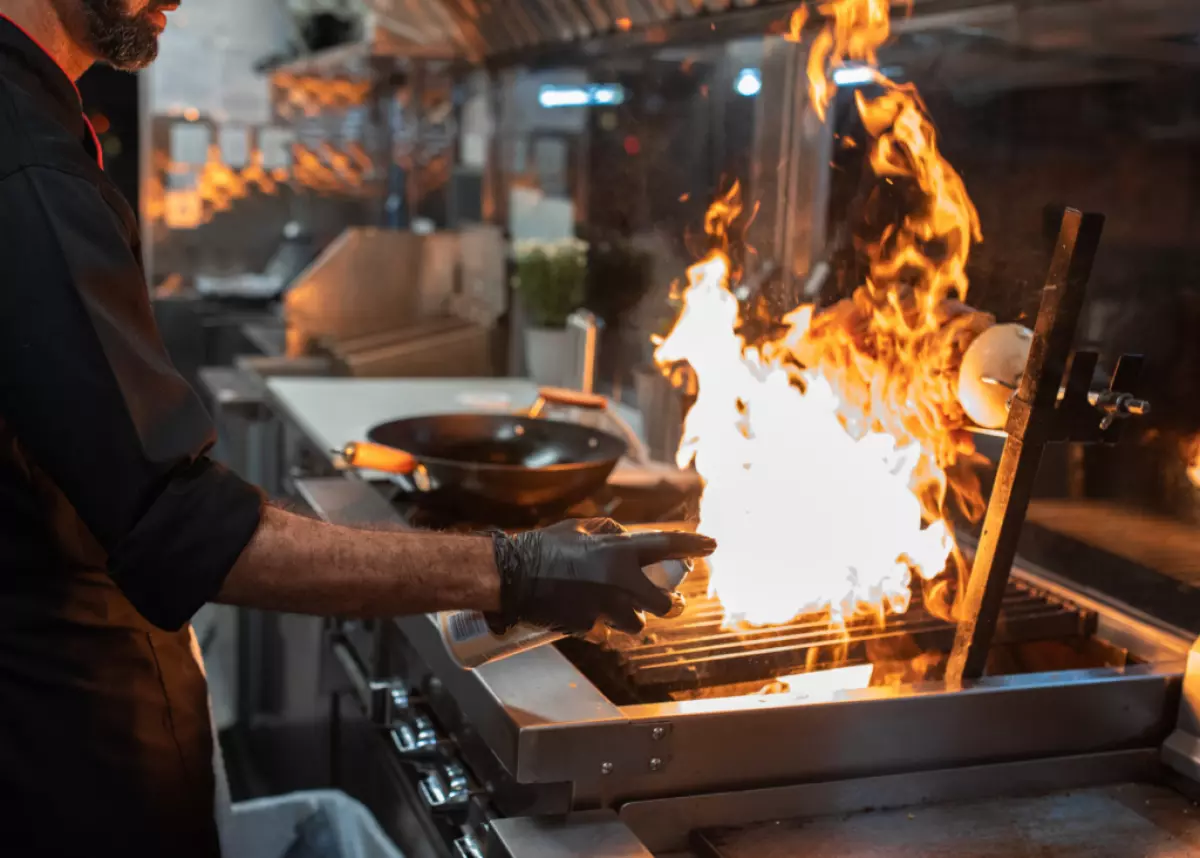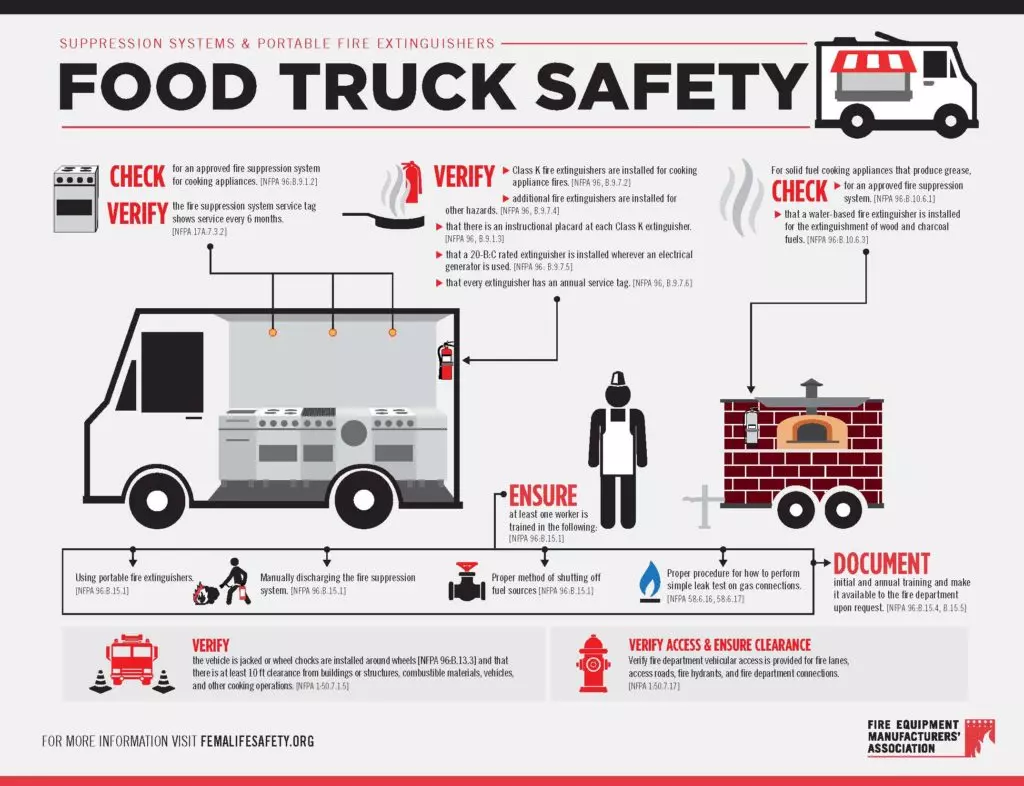Mobile food trucks have become a popular choice for many urban dwellers seeking delicious on-the-go meals. With thousands of these vehicles operating nationwide, it's crucial to prioritize the safety of both vendors and patrons. The National Fire Protection Agency (NFPA) has introduced new fire safety requirements specifically tailored to food trucks, helping operators protect their customers, employees, and business investment.
 Fire is a serious threat to food trucks because of all the possible fuel sources they carry.
Fire is a serious threat to food trucks because of all the possible fuel sources they carry.
Potential Hazards of Food Trucks
Food trucks are filled with various fire hazards that can quickly escalate into uncontrollable fires. From open flames and hot equipment to propane tanks and gas generators, these vehicles pose similar risks to commercial kitchens. Awareness of these hazards is crucial for food truck operators to proactively address and mitigate them, avoiding costly damage and potential harm to individuals.
To minimize these hazards, food trucks should implement comprehensive fire safety and suppression systems. While fires can start from stoves, ovens, and fryers, the most significant risk lies in fuel sources such as propane tanks, cooking oils, and other flammable substances necessary for running the food truck.
Propane Tanks
Propane is the leading cause of fires in food trucks, with 68% of incidents related to leaks or structural failures in these tanks. The explosive power of even a small 20-pound propane cylinder attached to a backyard grill is equivalent to 170 sticks of dynamite, producing over 425,000 BTUs of energy. Food trucks, which often carry 100-pound propane cylinders, pose a greater risk due to their mobility and presence in densely populated areas.
The constant movement of food trucks, coupled with the frequent swapping of propane tanks, increases the chances of leaks and loose connections. Undetected propane leaks inside a truck can pool near the floor and ignite with a single spark from the stove or oven. While carrying propane tanks on the outside of trucks reduces the risk of leaks, it raises concerns about tank explosions during even minor collisions.
Fire Suppression Systems
Cooking equipment is responsible for 61% of fires in food establishments. While commercial kitchens have long required hood suppression systems, older food trucks or converted vehicles often lack automatic fire suppression systems. These systems are crucial in rapidly detecting fires and shutting down the fuel or electric supply to nearby cooking equipment, preventing fires from spreading.
 NFPA requirements are making it easier for AHJs to implement comprehensive fire safety regulations for food trucks.
NFPA requirements are making it easier for AHJs to implement comprehensive fire safety regulations for food trucks.
Portable Generators
Portable generators used to power electricity in food trucks also present fire risks. Older and converted food trucks are particularly susceptible to these dangers, especially if proper ventilation is lacking. Carbon monoxide gas, a byproduct of generator operation, can accumulate within the confined space of a food truck. Additionally, insufficient provisions for storing fuel away from ignition sources further exacerbate the risks associated with generators.
Regulations for Food Trucks
Previously, food trucks faced a patchwork of regulations from various local governments, resulting in confusion and inconsistency. Recognizing the need for standardized fire safety practices in this industry, the National Fire Protection Agency (NFPA) has developed specific codes and standards for food trucks. These regulations provide clarity and guidance for food truck operators, ensuring compliance and enhancing safety measures.
Local Governments
In the absence of a national code or standard, each city previously created its own food truck regulations, leading to disparities in fire safety requirements. Food truck operators had to navigate a maze of rules regarding food preparation, parking, permits, and inspections, with regulations changing as they crossed city lines. The unique nature of food trucks further complicated matters, as traditional fire safety requirements for brick-and-mortar restaurants did not adequately address the mobility and structure of mobile kitchens.
NFPA
To streamline regulations and ensure the safety of food truck operators and customers, NFPA has developed fire safety codes specifically tailored to food trucks. These codes cover aspects such as installation, inspection, maintenance, testing, storage, and transportation of equipment and gas. By adhering to these regulations, food truck operators can meet city requirements and mitigate fire hazards effectively.
Food Trucks and Compliance
To ensure a successful operation, it is crucial for food truck owners to understand and address fire hazards. Compliance with NFPA code requirements is essential, and all fire and life safety equipment must be properly installed, regularly inspected, and consistently maintained by professional fire protection service providers. Below are key systems that food truck owners need to test and maintain for regulatory compliance and the safety of all stakeholders involved.
Fire Suppression System
Most local and state municipalities mandate the installation of a professionally designed fire suppression system in food trucks. Automatic fire suppression systems rapidly detect fires and shut down fuel or electricity supply to prevent fire spread. Given the use of cooking oils, propane, and natural gas, it is crucial for food truck owners to partner with fire protection companies experienced in designing and installing customized kitchen fire suppression systems. Semi-annual professional inspections are highly recommended to ensure optimal functionality.
Fire Extinguishers
Food truck owners must have readily accessible fire extinguishers on board. Two main types of extinguishers are necessary—Class K extinguishers for suppressing grease, fat, or cooking oil fires, and ABC extinguishers for other types of fires, such as those involving paper products. Proper knowledge of fire extinguisher usage is vital.
Ventilation Systems
Efficient ventilation systems are particularly crucial for food trucks due to limited space. Smoke and vapor can rapidly accumulate, making it difficult to breathe. Proper ventilation helps mitigate smoke build-up and eliminates hazardous oil and grease particles that could contribute to fires. Ventilation systems should adhere to local and state regulations, with quarterly inspections being a minimum requirement according to NFPA. Regular cleaning and maintenance should be conducted to ensure compliance and safety.
Continual Employee Training
While not classified as a fire and life safety system, well-trained employees play a vital role in fire hazard prevention. Regular training should be conducted to update employees on fire prevention and suppression best practices. This training should cover essential emergency procedures such as contacting the local fire department, understanding different fire extinguisher types, proper usage of fire extinguishers specific to the food truck, and safe fuel source management.
Hit the Road Safely
Food truck operators strive to provide high-quality, delicious food to the public. However, ensuring the safety of themselves, their workers, and their customers remains a top priority. With new NFPA regulations, there is increased awareness of fire hazards in food trucks, allowing operators to seek guidance and implement necessary safety measures. Prioritizing fire protection equipment and adherence to regulations is crucial for the success and longevity of any food truck.
If you are in need of fire protection equipment for your food truck, we offer a selection of ABC fire extinguishers. Additionally, Class K extinguishers specifically designed for grease fires can be ordered upon request.
Remember to follow us on social media for more updates and mouth-watering food truck highlights:
- TikTok
- YouTube

















